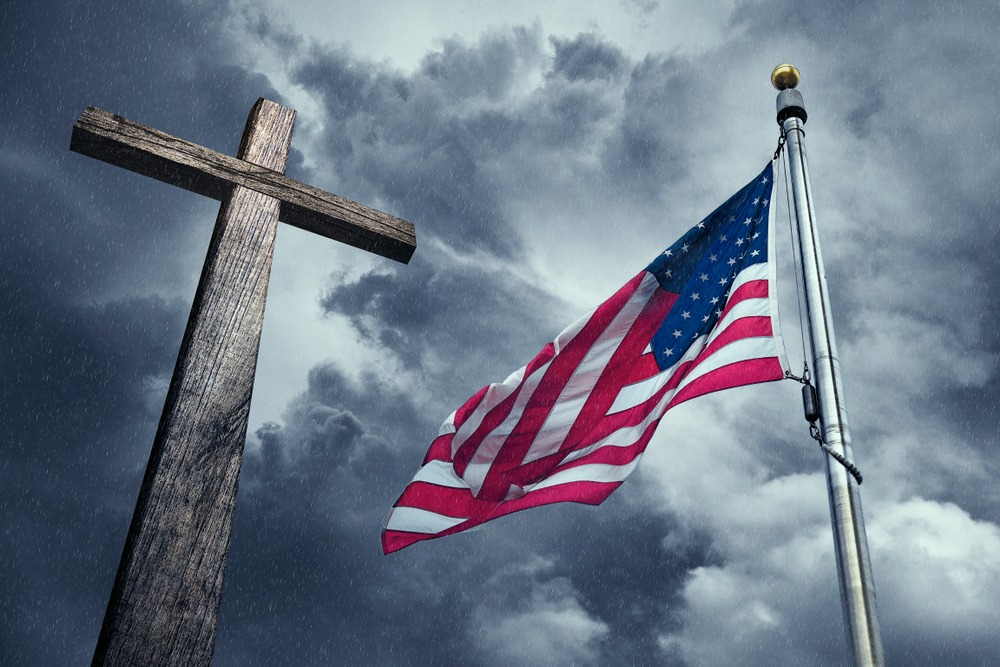Controversy erupted late last month when the New York Times reported that Supreme Court justice Samuel Alito once flew an “Appeal to Heaven” flag at his New Jersey vacation home. The paper alleged it was a symbol “for a push to remake American government in Christian terms.” After the story broke, a number of government bodies worked to strip the symbol from public spaces. For instance, the city of San Francisco announced that it has removed its own version of the flag from a municipal building.
The flag was originally adopted by New Englanders to show support for the American Revolution. The men who fought and died at Bunker Hill proudly flew it in defiance of British tyranny. The flag is even the official maritime ensign of the Commonwealth of Massachusetts. Until last week, it had nothing to do with imposing Christianity on government. But that matters little to the media—the outrage at Alito for his choice of patriotic imagery is part of a larger moral panic about “Christian nationalism.”
In his new book, Who’s Afraid of Christian Nationalism?, Mark David Hall contends that these liberal fears of theocracy are ill-founded. While there certainly are noxious elements o the right advocating for some kind of “Christian nationalism,” he convincingly argues that they remain very much in the minority. Populist authoritarianism poses real challenges to American constitutional order, but Hall demonstrates that the building threats to religious liberty should be far more concerning to the body politic.
This panic over “Christian nationalism” predates the rise of Donald Trump by at least a decade. Some on the left were expressing their concerns as early as 2006, when President George W. Bush and his evangelical supporters were tarred as religious extremists. Now most of the establishment media hold up Bush as a kind of “elder statesman,” a palatable alternative to Trump. But this only shows how far the goalposts have shifted regarding the definition of “Christian nationalism.”
It is true that the concept is infamously difficult to define. Is a Christian nationalist narrowly a Calvinist dedicated to theonomy or a Roman Catholic attracted to integralism? Or is a Christian nationalist simply anyone who thinks their religion should have some sort of influence on public policy, even in a benign way? Because of how politically charged the question is, Hall argues it is difficult to come to an authoritative definition of Christian nationalism.
But even with all the media attention Christian nationalism has received, few Americans actually identify with the label. Hall cites one Pew study that suggests only 5% of the American public even has a positive view of the ideology. Yet two sociologists influential in this debate, Andrew Whitehead and Samuel Perry, have gone so far as to assert that more than half of all Americans are Christian nationalists. Hall shows, however, that their criteria reveal more about their “implicit biases” against conservatives than the actual views of the public. They wind up exaggerating “the toxicity of Christian nationalism” and overstating “the percentage of Americans who fully or partially embrace this phenomenon.”
The sad fact is that much of the recent commentary and scholarship on Christian nationalism aims more at driving a political agenda than identifying what conservatism really means today. In the book, Hall takes many critics to task for “flawed research” and an overreliance on “polemical authors.” Some, for instance, overstate the influence of theonomist Rousas Rushdoony—who is, in fact, a fairly niche figure even in Calvinist circles. Very rarely do even self-consciously “scholarly” treatments of Christian nationalism make a serious effort to explore the origins of the conservative movement or, for that matter, religious trends through even recent history. Most of the work being done on the concept simply aims to make religious conservatives look as bad as possible.
Hall also refutes unfair claims that racism is one of the dark forces motivating religious conservatives. Although the notion is commonly asserted by critics of Christian nationalists, Hall traces it back to a “disgruntled evangelical historian” named Randall Balmer. His work has a number of major historical errors that Hall ably dispels, but nonetheless remains widely cited. The only conclusion one can make is that many of Christian nationalism’s most polemical critics are merely arguing in bad faith.
Nonetheless, Hall remains cognizant that there really are would-be-autocrats in public life deploying Christian nationalism to justify their hunger for power. Around 2022, several public figures and writers openly embraced the label to describe their views. Among the more serious of these is political scientist Stephen Wolfe, author of The Case for Christian Nationalism. Wolfe and others in the small group of self-admitted Christian nationalists support, according to Hall, “official government recognition of the truths of Christianity,” as well as various coercive measures to impose their political vision on society.
One of the stranger aspects of Wolfe’s book is his focus on ethnicity. He seems to believe that due to some “principle of similarity,” no true nation can consist of multiple ethnicities. Even if Wolfe is not engaged in the most noxious kinds of white nationalism, his radical particularism concerningly mirrors the ideas of Russian theorist Aleksandr Dugin, one of the major proponents of Vladimir Putin’s invasion of Ukraine. The similarities between the way Dugin uses the phrase “ethnos” in his Fourth Political Theory and the way Wolfe uses the term “ethnicity” raise interesting questions about just how internationalist “Christian nationalism” may be. Hall unfortunately does not ask them himself, but perhaps an enterprising scholar or reporter will in the future.
Admirably, Hall does not avoid the painful fact that there are virulent racists, misogynists, and other authoritarians active on the American right. But he correctly recognizes that these factions are more diverse than you would think. Some may identify as Christian, yes, but many are better categorized as neo-pagan or even progressive. The far right is a many-headed hydra, and liberal narratives about it are often far, far too simplistic.
Toward the end of the book, Hall ventures his own definition of “Christian nationalism.” Limiting the scope of the term, he defines adherents as those who seek to privilege “Christianity above other faiths” in law and policy. This may constitute a threat to religious liberty, but it is by no means as toxic as the worst segments of the alt-right, such as those who staged the August 2017 “Unite the Right” rally in Charlottesville, Virginia. And it is clear by the end of Who’s Afraid of Christian Nationalism that, wrongheaded as these genuine Christian nationalists may be, they by no means pose an existential threat to the constitutional order.
Still, Hall offers a variety of theological and prudential reasons to reject the ideology of Christian nationalism. As a scholar of American religion, and author of several impressive works on the relationship between Christianity and the Founding, Hall is well suited to offer an alternative path forward. He stresses the Founding’s vision for human flourishing, a hope for a people set free to worship God and live according to conscience.
As such, Hall is defending the right—and even the duty—of religious Americans to play a role in the public square. He believes that the heart of a truly Christian politics must be the notion that all human beings are created in the image of God and deserve to have this dignity respected. Christians in America can and should advance a robust sense of freedom, including religious liberty, not just because they are Americans but also because they are Christians. The constitutional order can be legitimately interpreted as a political application of Christ’s “Golden Rule” teaching in Matthew 7:12: “Therefore all things whatsoever ye would that men should do to you, do ye even so to them: for this is the law and the prophets.”
It is disappointing, therefore, that progressive activists and their allies in the mainstream media are so eager to dismiss displays of traditional patriotism as “Christian nationalism.” The heritage Hall outlines toward the end of this book, and in his other scholarship, is in fact one of the greatest rebukes of tyranny and bigotry in human history. As heroic statesmen and citizens from the Founding up through the civil rights movement and beyond have shown, this country is a better place when it recognizes that every American deserves the right to an appeal to Heaven.

